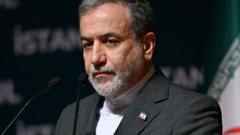The US and UK have reached a new agreement to cut tariffs on British cars and metals, providing significant relief for vital UK industries. However, key details remain sparse and industry analysts caution that the deal may not significantly change pre-existing trade dynamics.
US and UK Forge New Trade Deal Reducing Tariffs on Key Exports

US and UK Forge New Trade Deal Reducing Tariffs on Key Exports
In a move aimed at strengthening economic ties, the US has announced a reduction in tariffs on UK cars and metals, while allowing certain imports tariff-free.
The US has officially agreed to lower import tariffs on a specific number of British vehicles and permit some steel and aluminum imports without tariffs, marking a significant trade agreement between the United States and the United Kingdom. This initiative, announced against the backdrop of President Donald Trump's recent return to the White House, aims to alleviate burdens from tariffs he had previously instituted.
While the arrangement offers some reprieve for critical sectors in the UK, a 10% duty will remain on the majority of British exports. Leaders from both countries celebrated the announcement, but analysts expressed skepticism, highlighting that it may not significantly alter the trade landscape compared to pre-Trump tariffs.
During the announcement, Sir Keir Starmer, speaking from a Jaguar Land Rover facility in the West Midlands, applauded the deal, calling it a "fantastic platform" that protects thousands of British jobs in pivotal sectors like automotive. Trump termed it a "great deal," rebuffing claims that he overstated its significance and asserting that discussions would continue to build on it.
The specifics of the deal include reducing the import tax on vehicles from 25% to 10% for up to 100,000 units annually. This concession offers relief particularly for luxury brands such as Jaguar Land Rover and Rolls Royce, although experts fear it may cap expansion potential in the future since this number aligns with last year's export figures.
UK officials, including Business Secretary Jonathan Reynolds, indicated that the agreement was critical in preventing imminent job losses in the automotive sector due to the previous tariff structure. The US also agreed to introduce a quota for steel and aluminum imports, replacing the strict taxes previously imposed.
Furthermore, both nations will allow duty-free imports of up to 13,000 metric tonnes of beef each year, which had faced previous limitations. The deal is expected to unlock a $5 billion export opportunity for both countries, particularly benefiting the agricultural sector.
Despite the positive reception from some sectors, responses varied. Gareth Stace from UK Steel welcomed the agreement as "major relief" while others from the business community expressed cautious optimism. Criticism from opposition parties echoed concerns that while it's an improvement, it doesn't measure up to what was lost prior to the agreement.
Conservative leaders raised alarms about the implications of this trade deal, claiming that it favors US interests while British elements are being shortchanged. The Liberal Democrats demanded full parliamentary scrutiny of the terms, arguing for transparency in moving forward.
Amidst ongoing trade discussions, particularly concerning pharmaceutical markets, it remains to be seen if the nuances of the agreement will translate into tangible benefits for British economic interests, as both nations navigate the complexities of global trade in a post-Brexit context.




















